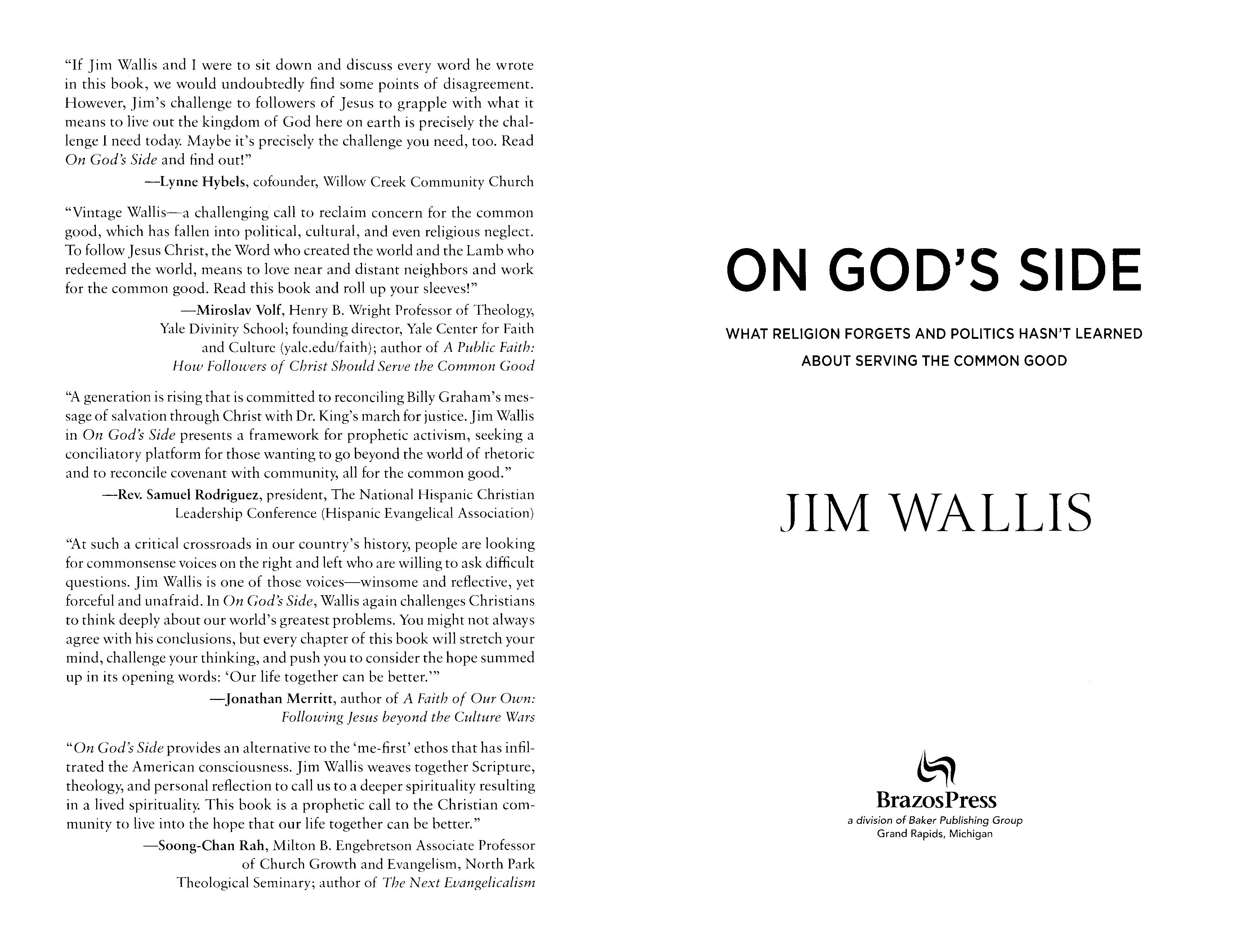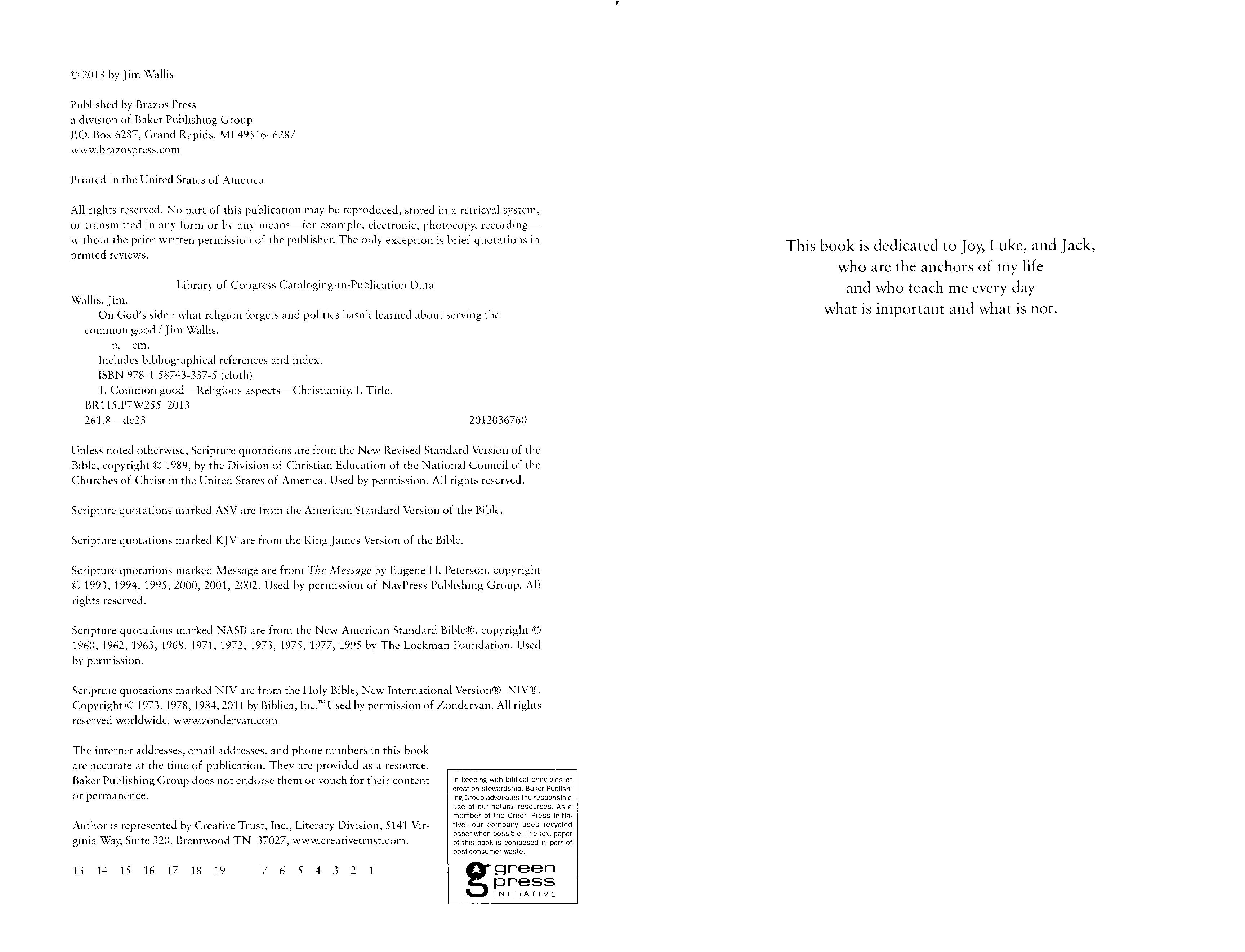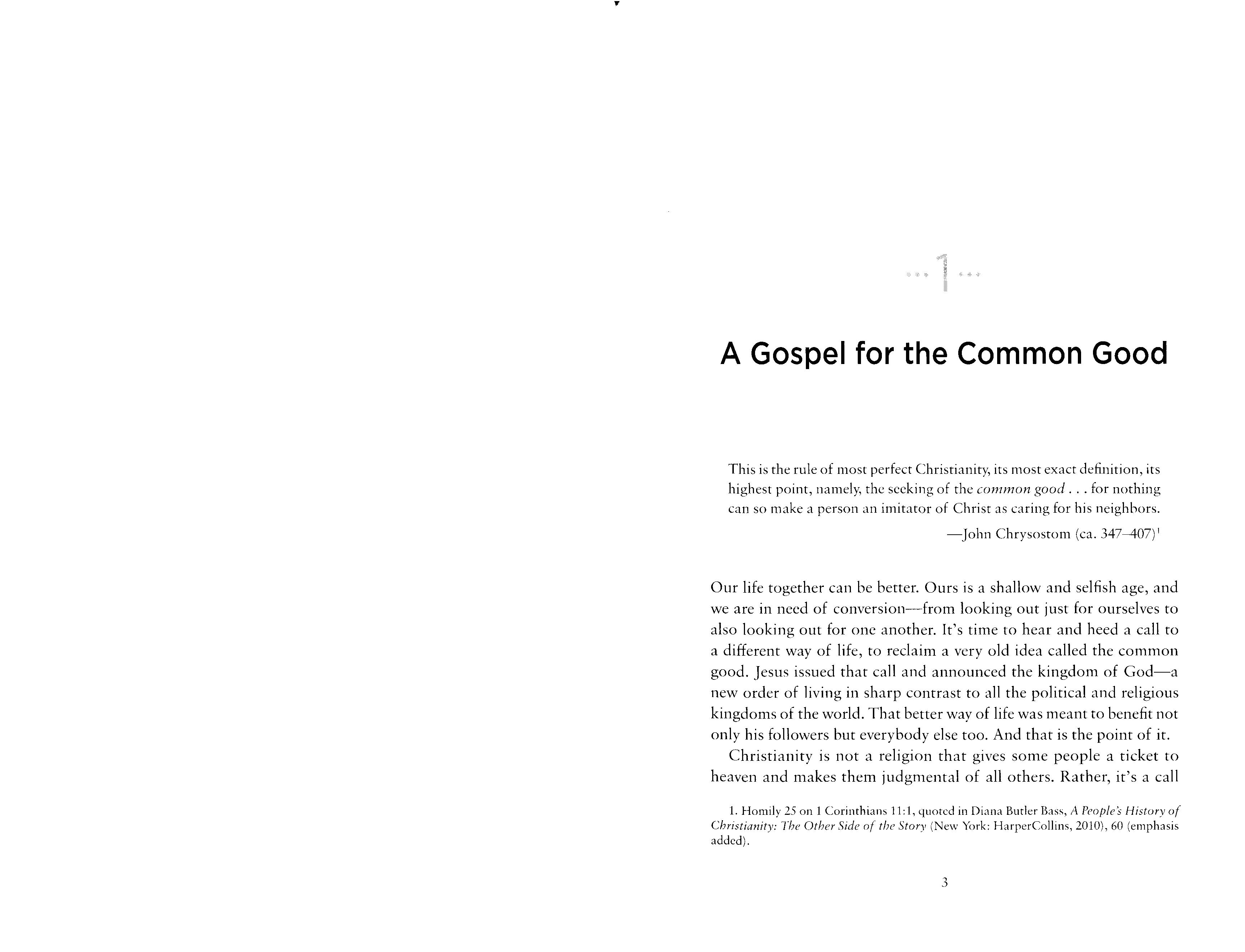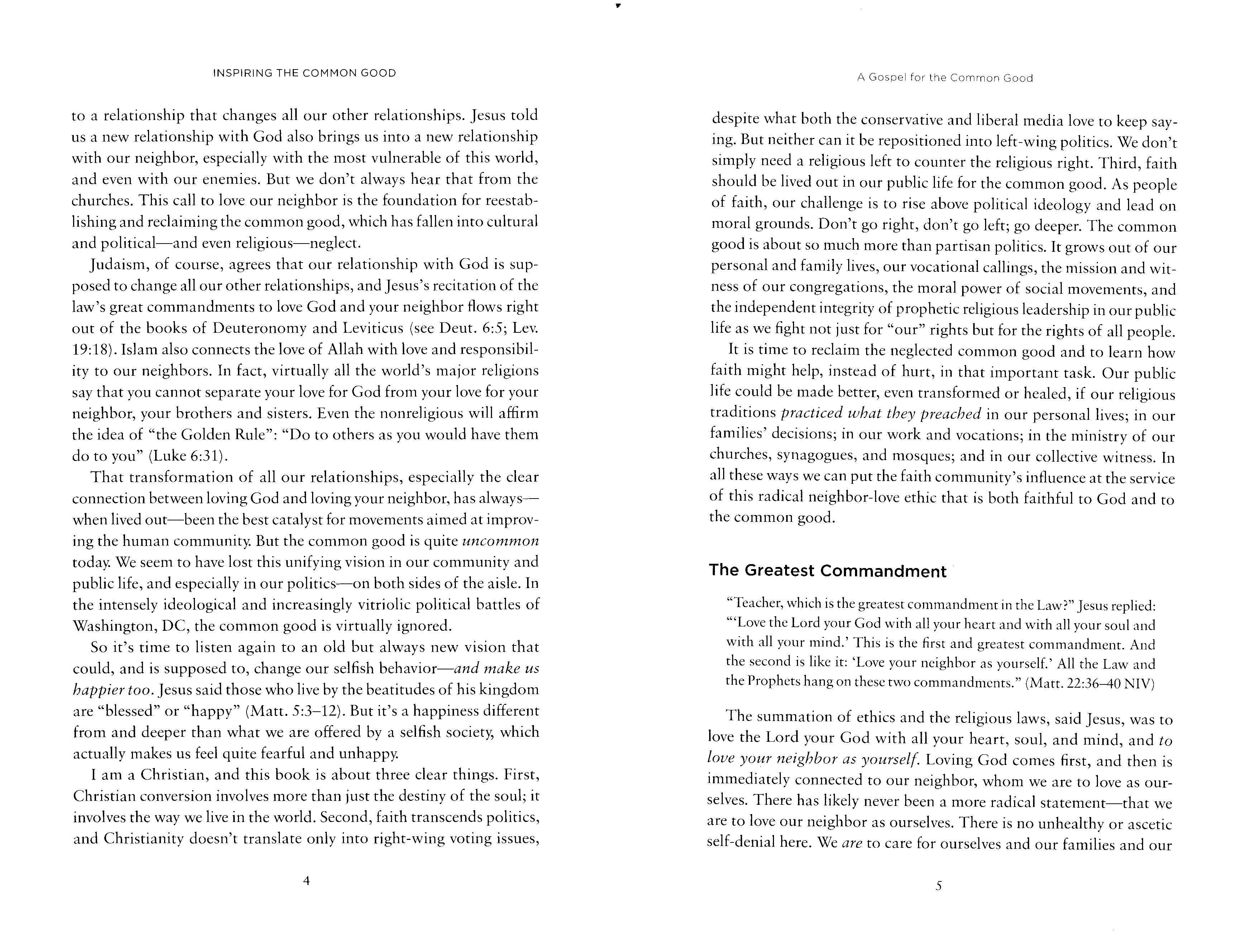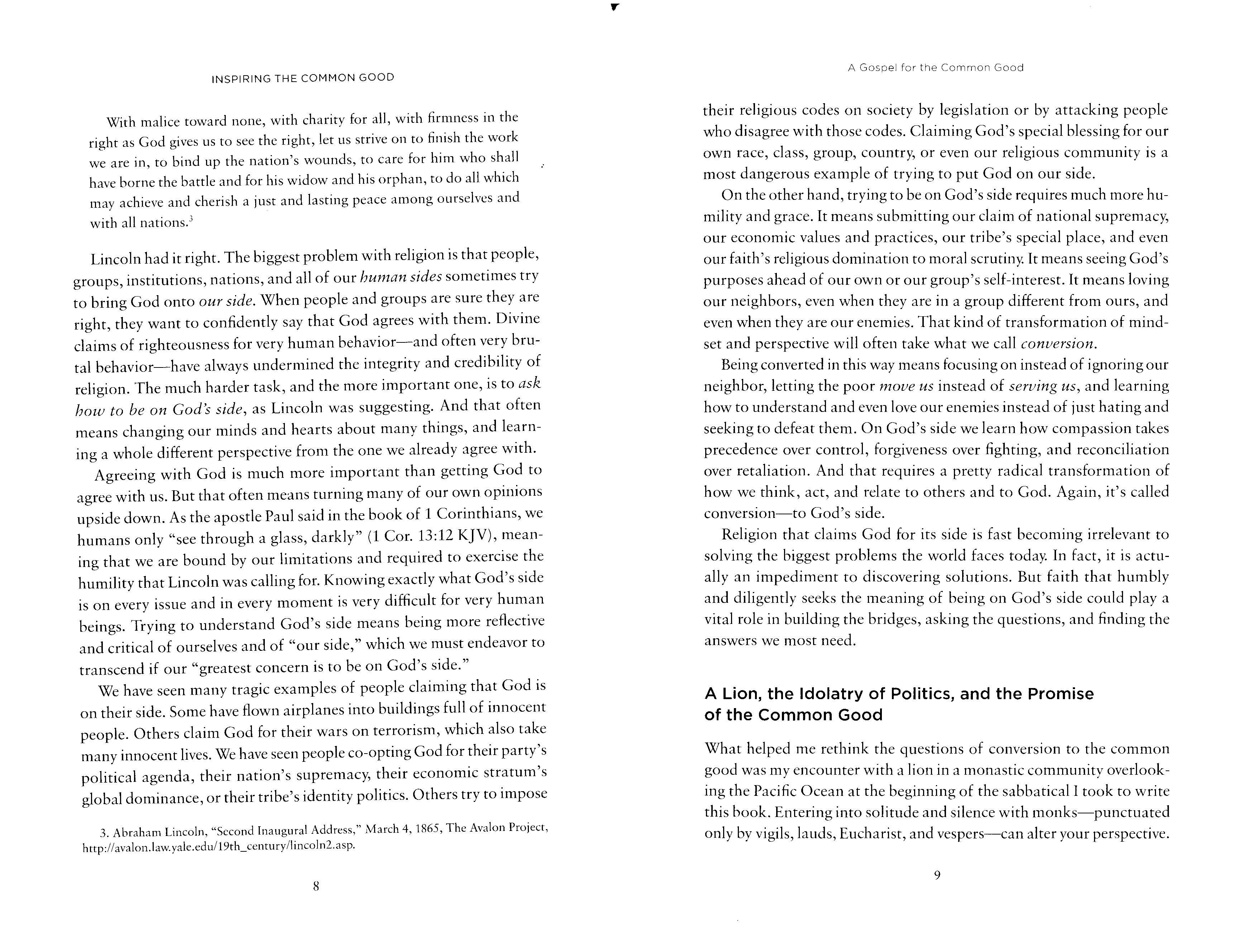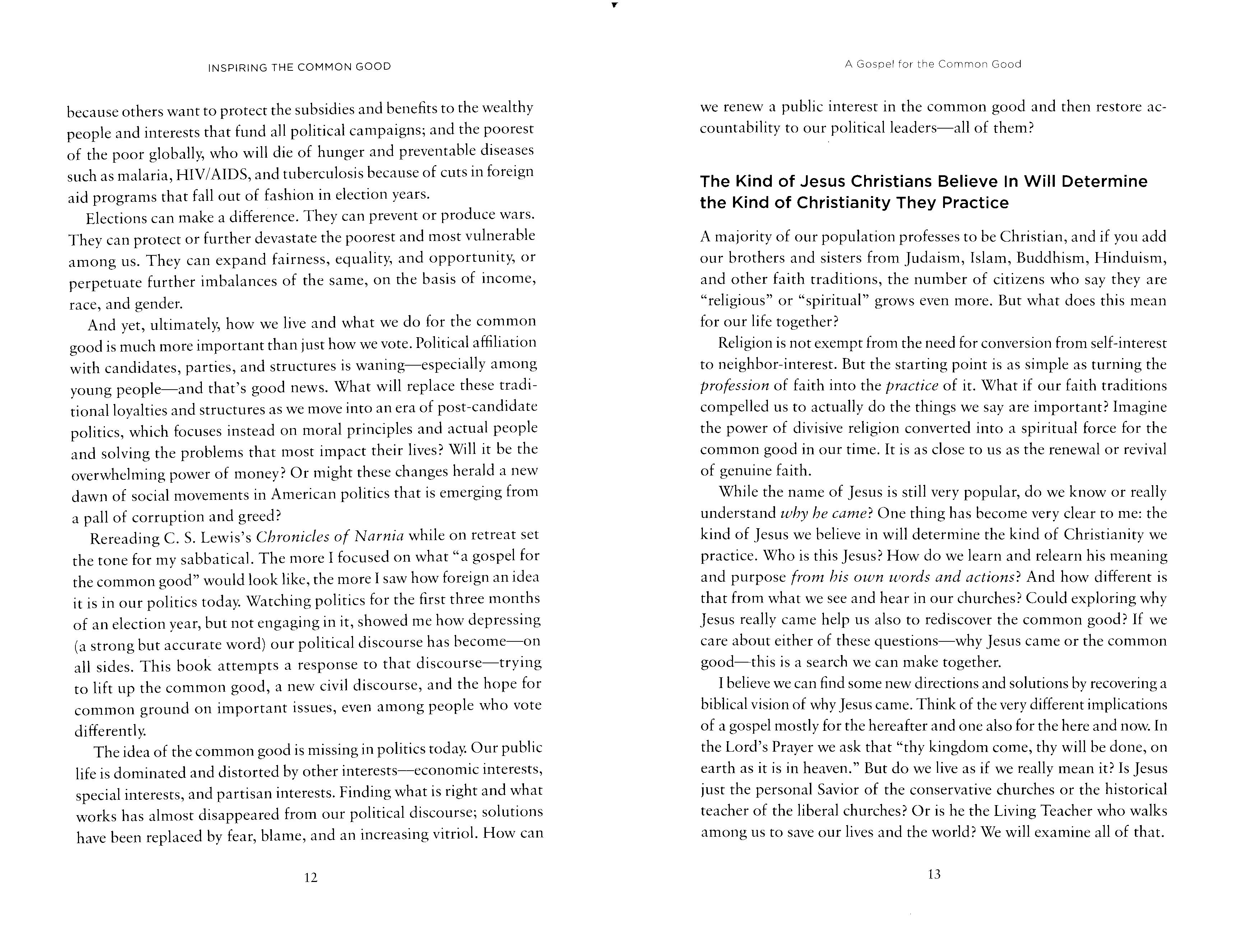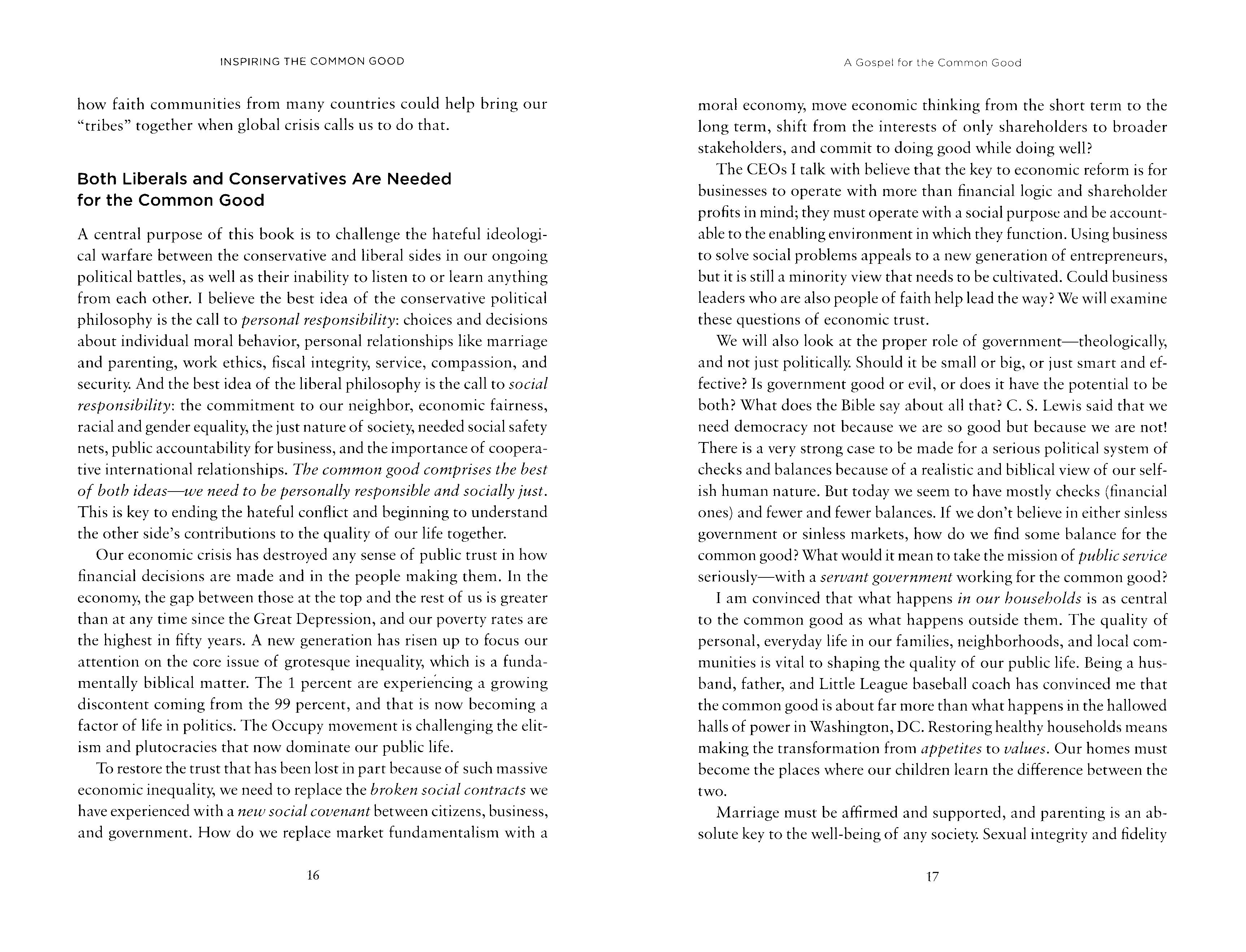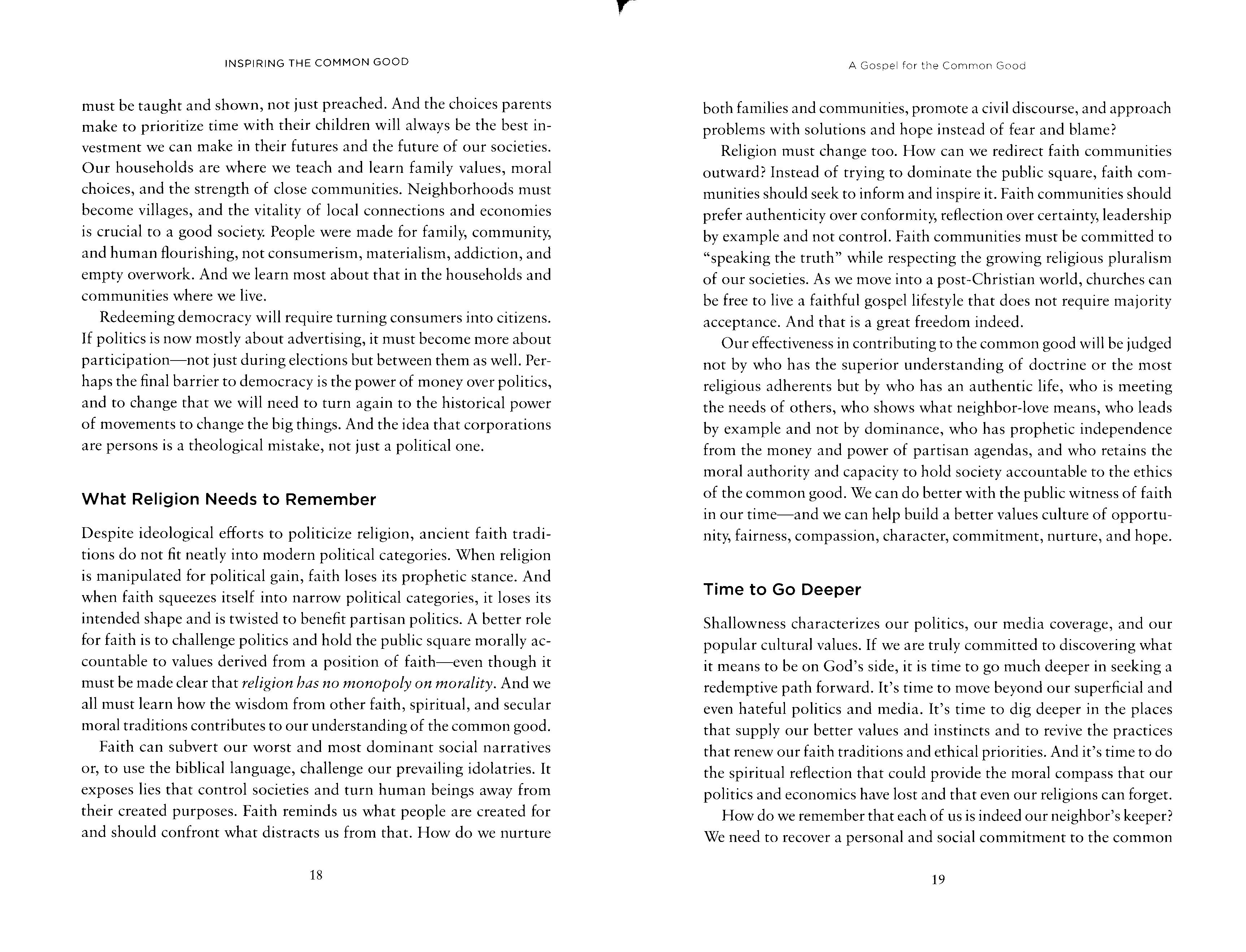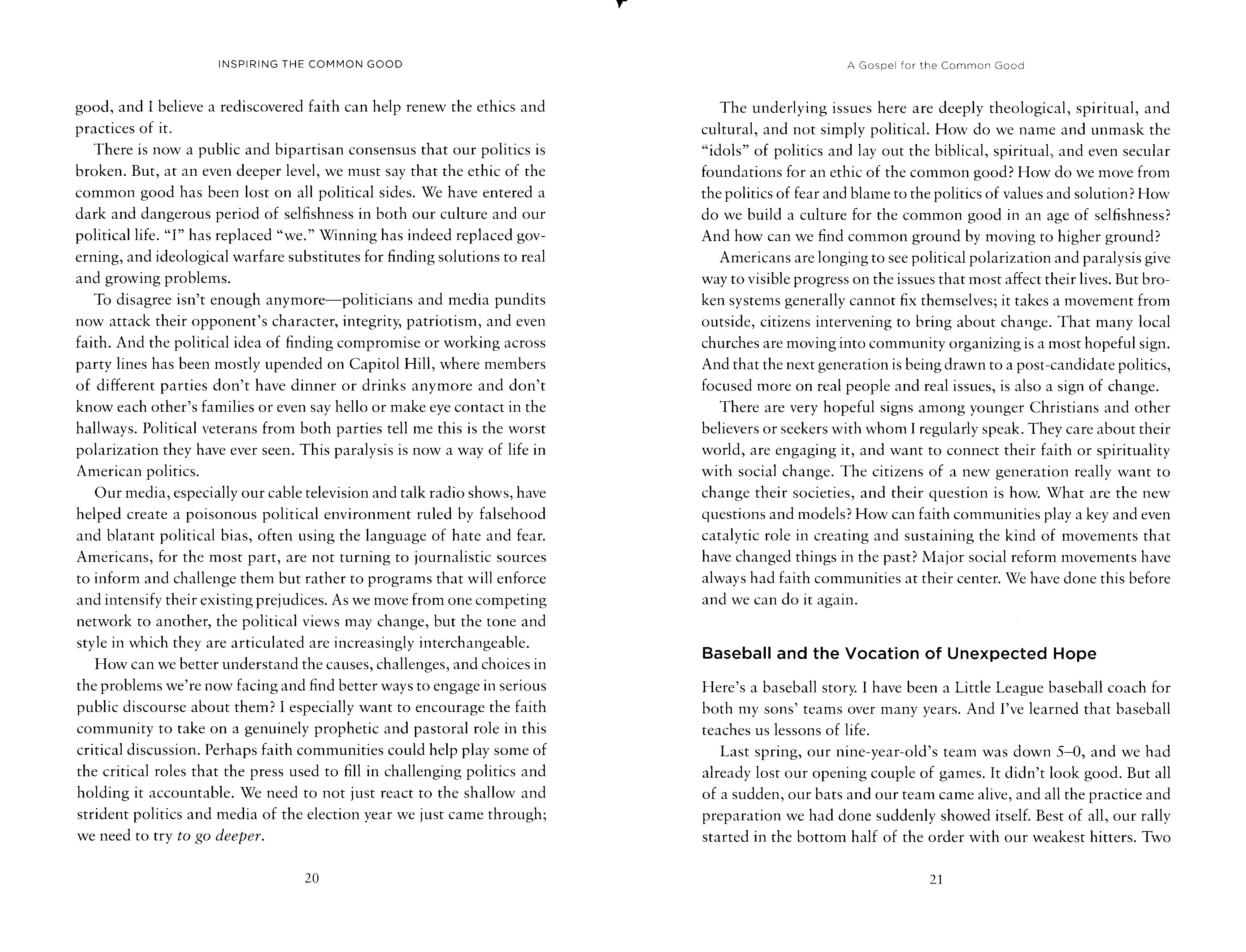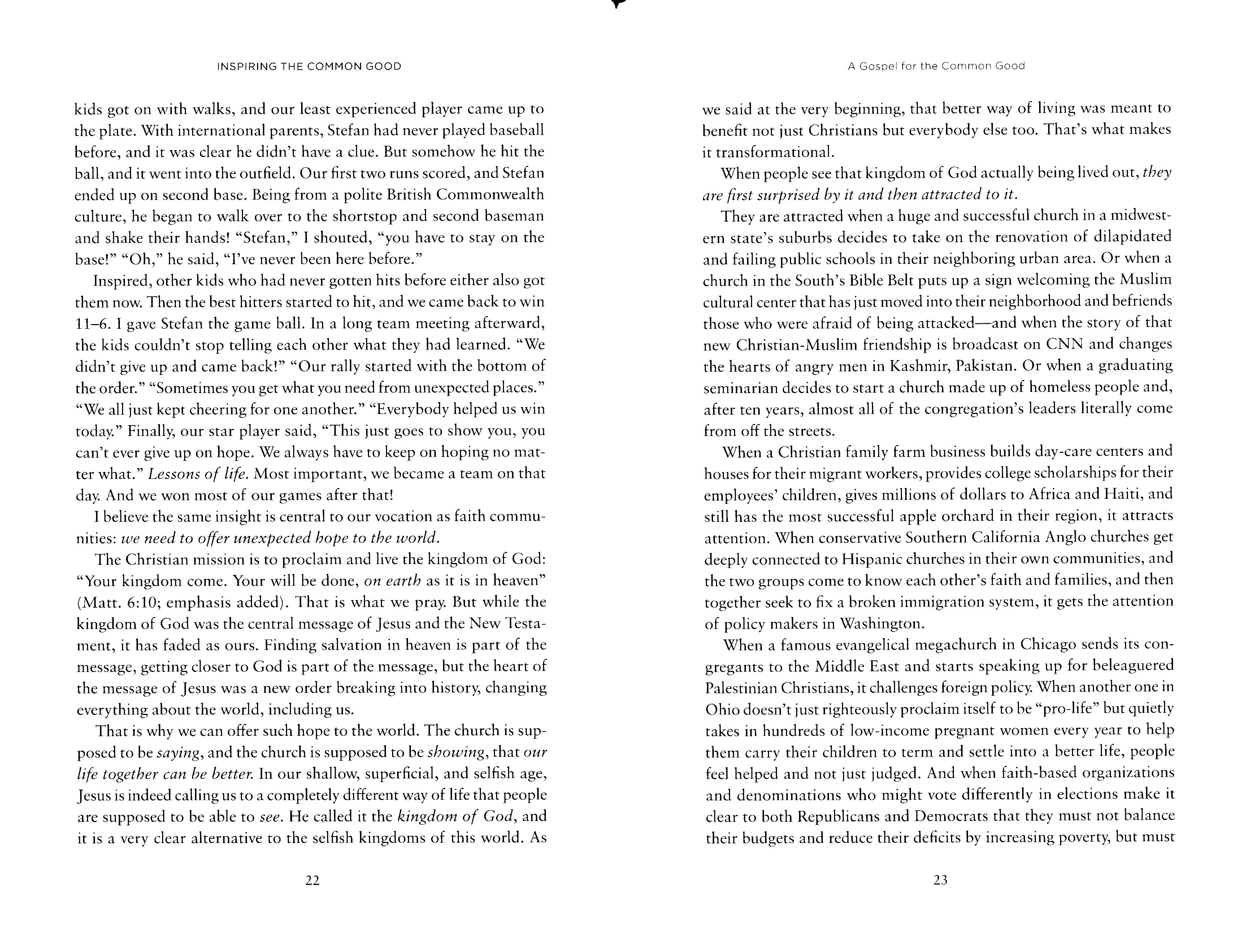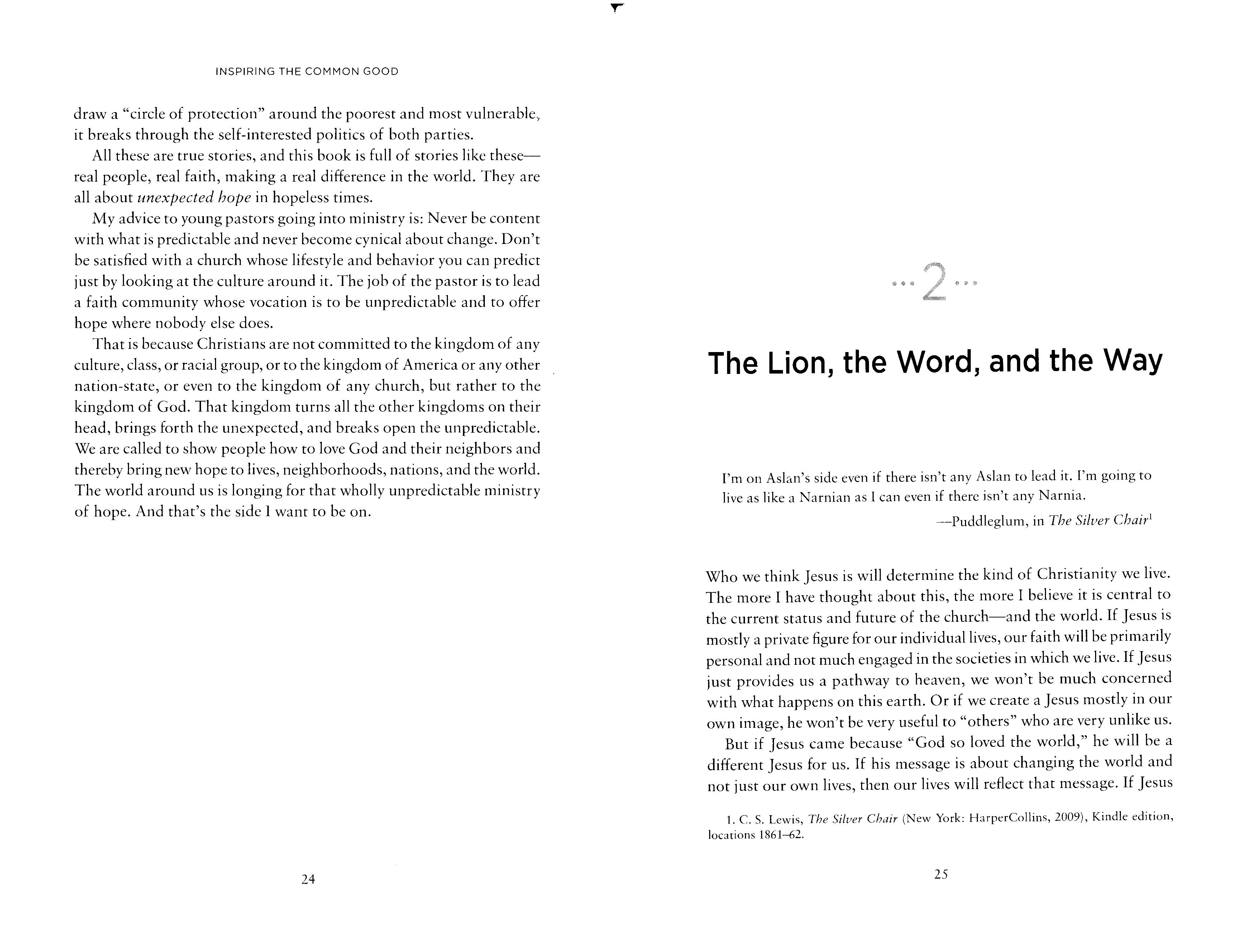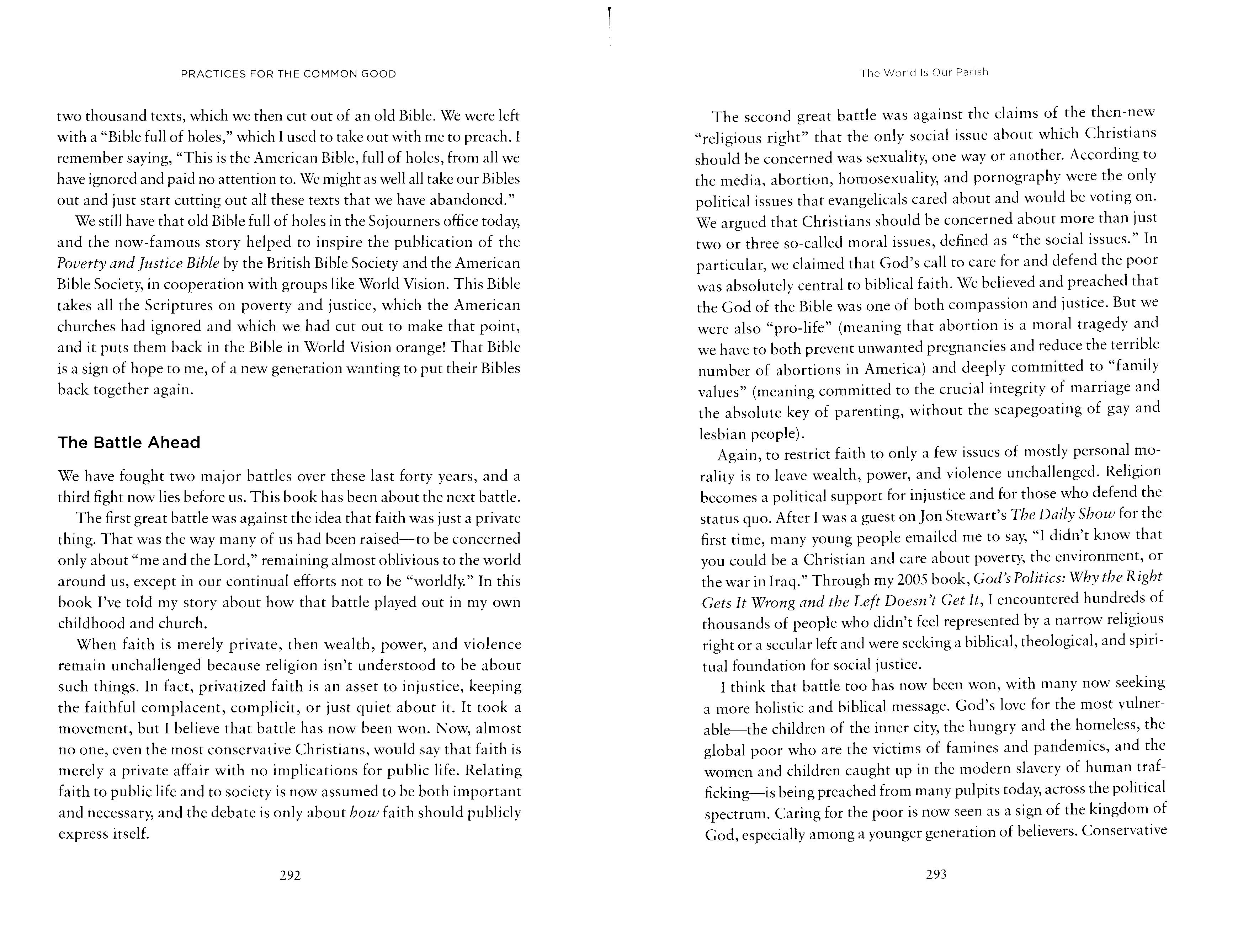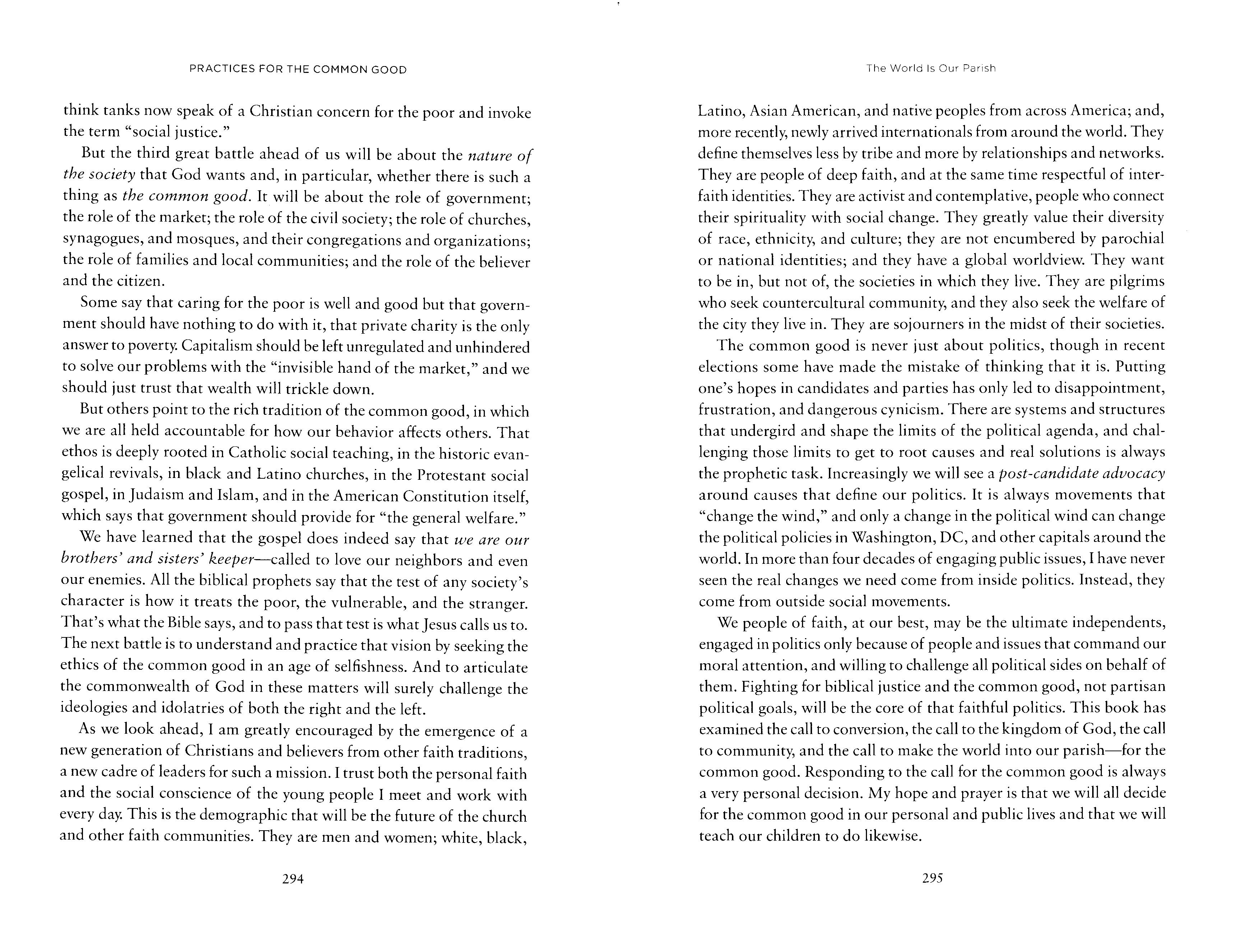A Gospelfor the Common Good
This is the rule of most perfect Christianity, its most exact definition, its highest point, namely, the seeking of the common good . .. for nothing can so make a person an imitator of Christ as caring for his neighbors.
-John Chrysostom (ca. 347--407) 1
Our life together can be better. Ours is a shallow and selfish age, and we are in need of conversion-from looking out just for ourselves to also looking out for one another. It's time to hear and heed a call to a different way of life, to reclaim a very old idea called the common good. Jesus issued that call and announced the kingdom of God-a new order of living in sharp contrast to all the political and religious kingdoms of the world. That better way of life was meant to benefit not only his followers but everybody else too. And that is the point of it. Christianity is not a religion that gives some people a ticket to heaven and makes them judgmental of all others. Rather, it's a call
l. Homily 25 on I Corinthians 11: I, quoted in Diana Butler Bass, A Peoples History of Christianity: The Other Side of the Story (New York: HarperCollins, 2010), 60 (emphasis added).
to a relationship that changes all our other relationships. Jesus told us a new relationship with God also brings us into a new relationship with our neighbor, especially with the most vulnerable of this world, and even with our enemies. But we don't always hear that from the churches. This call to love our neighbor is the foundation for reestablishing and reclaiming the common good, which has fallen into cultural and political-and even religious-neglect.
Judaism, of course, agrees that our relationship with God is supposed to change all our other relationships, and Jesus's recitation of the law's great commandments to love God and your neighbor flows right out of the books of Deuteronomy and Leviticus (see Deut. 6:5; Lev. 19:18). Islam also connects the love of Allah with love and responsibility to our neighbors. In fact, virtually all the world's major religions say that you cannot separate your love for God from your love for your neighbor, your brothers and sisters. Even the nonreligious will affirm the idea of "the Golden Rule": "Do to others as you would have them do to you" (Luke 6:31).
That transformation of all our relationships, especially the clear connection between loving God and loving your neighbor, has alwayswhen lived out-been the best catalyst for movements aimed at improving the human community. But the common good is quite uncommon today. We seem to have lost this unifying vision in our community and public life, and especially in our politics-on both sides of the aisle. In the intensely ideological and increasingly vitriolic political battles of Washington, DC, the common good is virtually ignored.
So it's time to listen again to an old but always new vision that could, and is supposed to, change our selfish behavior-and make us happier too. Jesus said those who live by the beatitudes of his kingdom are "blessed" or "happy" (Matt. 5:3-12). But it's a happiness different from and deeper than what we are offered by a selfish society, which actually makes us feel quite fearful and unhappy.
I am a Christian, and this book is about three clear things. First, Christian conversion involves more than just the destiny of the soul; it involves the way we live in the world. Second, faith transcends politics, and Christianity doesn't translate only into right-wing voting issues,
despite what both the conservative and liberal media love to keep saying. But neither can it be repositioned into left-wing politics. We don't simply need a religious left to counter the religious right. Third, faith should be lived out in our public life for the common good. As people of faith, our challenge is to rise above political ideology and lead on moral grounds. Don't go right, don't go left; go deeper. The common good is about so much more than partisan politics. It grows out of our personal and family lives, our vocational callings, the mission and witness of our congregations, the moral power of social movements, and the independent integrity of prophetic religious leadership in our public life as we fight not just for "our" rights but for the rights of all people. It is time to reclaim the neglected common good and to learn how faith might help, instead of hurt, in that important task. Our public life could be made better, even transformed or healed, if our religious traditions practiced what they preached in our personal lives; in our families' decisions; in our work and vocations; in the ministry of our churches, synagogues, and mosques; and in our collective witness. In all these ways we can put the faith community's influence at the service of this radical neighbor-love ethic that is both faithful to God and to the common good.
The Greatest Commandment
"Teacher, which is the greatest commandment in the Law?" Jesus replied: '"Love the Lord your God with all your heart and with all your soul and with all your mind.' This is the first and greatest commandment. And the second is like it: 'Love your neighbor as yourself.' All the Law and the Prophets hang on these two commandments." (Matt. 22:36--40 NIV)
The summation of ethics and the religious laws, said Jesus, was to love the Lord your God with all your heart, soul, and mind, and to love your neighbor as yourself Loving God comes first, and then is immediately connected to our neighbor, whom we are to love as ourselves. There has likely never been a more radical statement-that we are to love our neighbor as ourselves. There is no unhealthy or ascetic self-denial here. We are to care for ourselves and our families and our
children, but we are asked to also care for our neighbors as ourselves, and our neighbor's children as our children. This is an ethic that would transform the world. It was supposed to, and it has.
This most fundamental teaching of faith flies right in the face of all the selfish personal and political ethics that put myself always before all others: my concerns first, my rights first, my freedoms first, my interests first, my tribe first, and even my country first-ahead of everybody else. Self-concern is the personal and political ethic that dominates our world today, but the kingdom of God says that our neighbor's concerns, rights, interests, freedoms, and well-being are as important as our own.
This ethic is not only radical and transformational; it is absolutely essential if we are to create a public life that is not completely dominated by political conflict, and if we are to articulate what might be in the interest of the common good. Perhaps, if we follow this teaching, we will even find some common ground between us.
Living out the neighbor ethic is essential to religion attaining any credibility again. Otherwise, the next generation is just going to move on from religion. Ask this question: Is love of neighbor the primary thing that people think about when they watch the behavior of our faith communities and institutions? Or are they more likely to see selfinterest and judgment of others?
Religion makes a big mistake when its primary public posture is to protect itself and its own interests. It's even worse when religion tries to use politics to enforce its own codes and beliefs or to use the force of law to control the behavior of others. Religion does much better when it leads-when it actually cares about the needs of everybody, not just its own community, and when it makes the best inspirational and commonsense case, in a pluralistic democracy, for public policies that express the core values of faith in regard to how we should all treat our neighbors.
There is a deep hunger, especially among a new generation of young people, for a new ethic of loving our neighbors, in our neighborhoods and around the world. But who will offer leadership toward a new (and old) neighbor ethic for the common good? If the faith community does
A Gospel for the Common Good
that, people will actually be drawn back to faith; but if we don't, our losses will continue until the majority of people will answer religious surveys with "none of the above," currently the fastest-growing affiliation.
Mr. Lincoln and Being "On God's Side"
Abraham Lincoln famously said, "My concern is not whether God is on our side; my greatest concern is to be on God's side. " 2 That was probably the most important thing about religion ever said by an American president. Presidents and politicians usually want to bring God onto their side, their country's side, their party's side, and even their political policy's side. Right after the American Civil War, the most brutal and divisive war in American history, the winning side was clearly tempted to triumphalism. But Lincoln felt the shame of the horrible conflict, the sin on all sides, and the need for humble repentance if there was ever to be reconciliation and unity again. In his second inaugural address, he said:
Neither party expected for the war the magnitude or the duration which it has already attained .... Each looked for an easier triumph, and a result less fundamental and astounding. Both read the same Bible and pray to the same God, and each invokes His aid against the other The prayers of both could not be answered. That of neither has been answered fully. The Almighty has His own purposes Fondly do we hope, fervently do we pray, that this mighty scourge of war may speedily pass away. Yet, if God wills that it continue until all the wealth piled by the bondsman's two hundred and fifty years of unrequited toil shall be sunk, and until every drop of blood drawn with the lash shall be paid by another drawn with the sword, as was said three thousand years ago, so still it must be said "the judgments of the Lord are true and righteous altogether."
2. The exact wording is disputed, but Rev. Matthew Simpson, in his address delivered at Lincoln's funeral, attested that Lincoln said this. Sec http://bcck.library.emory.edu/lincoln /page.php?id=simpson16. The thought is also attributed to Lincoln in the 1867 hook Six Months at the White House with Abraham Lincoln by Francis B. Carpenter (p. 282); see http://books.google.com/books/about/Six_months_at_the_ White_House_with_Abrah.html ?id=3W4FAAAAQAAJ. 7
With malice toward none, with charity for all, with firmness in the right as God gives us to see the right, let us strive on to finish the work we are in, to bind up the nation's wounds, to care for him who shall have borne the battle and for his widow and his orphan, to do all which may achieve and cherish a just and lasting peace among ourselves and with all nations. 3
Lincoln had it right. The biggest problem with religion is that people, groups, institutions, nations, and all of our human sides sometimes try to bring God onto our side. When people and groups are sure they are right, they want to confidently say that God agrees with them. Divine claims of righteousness for very human behavior-and often very brutal behavior-have always undermined the integrity and credibility of religion. The much harder task, and the more important one, is to ask how to be on God's side, as Lincoln was suggesting. And that often means changing our minds and hearts about many things, and learning a whole different perspective from the one we already agree with.
Agreeing with God is much more important than getting God to agree with us. But that often means turning many of our own opinions upside down. As the apostle Paul said in the book of 1 Corinthians, we humans only "see through a glass, darkly" (1 Cor. 13:12 KJV), meaning that we are bound by our limitations and required to exercise the humility that Lincoln was calling for. Knowing exactly what God's side is on every issue and in every moment is very difficult for very human beings. Trying to understand God's side means being more reflective and critical of ourselves and of "our side," which we must endeavor to transcend if our "greatest concern is to be on God's side."
We have seen many tragic examples of people claiming that God is on their side. Some have flown airplanes into buildings full of innocent people. Others claim God for their wars on terrorism, which also take many innocent lives. We have seen people co-opting God for their party's political agenda, their nation's supremacy, their economic stratum's global dominance, or their tribe's identity politics. Others try to impose
3. Abraham Lincoln, "Second Inaugural Address," March 4, 1865, The Avalon Project, http:// avalon. law.yale .ed u/ 19th_ century /I in col n2. asp.
their religious codes on society by legislation or by attacking people who disagree with those codes. Claiming God's special blessing for our own race, class, group, country, or even our religious community is a most dangerous example of trying to put God on our side.
On the other hand, trying to be on God's side requires much more humility and grace. It means submitting our claim of national supremacy, our economic values and practices, our tribe's special place, and even our faith's religious domination to moral scrutiny. It means seeing God's purposes ahead of our own or our group's self-interest. It means loving our neighbors, even when they are in a group different from ours, and even when they are our enemies. That kind of transformation of mindset and perspective will often take what we call conversion.
Being converted in this way means focusing on instead of ignoring our neighbor, letting the poor move us instead of serving us, and learning how to understand and even love our enemies instead of just hating and seeking to defeat them. On God's side we learn how compassion takes precedence over control, forgiveness over fighting, and reconciliation over retaliation. And that requires a pretty radical transformation of how we think, act, and relate to others and to God. Again, it's called conversion-to God's side.
Religion that claims God for its side is fast becoming irrelevant to solving the biggest problems the world faces today. In fact, it is actually an impediment to discovering solutions. But faith that humbly and diligently seeks the meaning of being on God's side could play a vital role in building the bridges, asking the questions, and finding the answers we most need.
A Lion, the Idolatry of Politics, and the Promise of the Common Good
What helped me rethink the questions of conversion to the common good was my encounter with a lion in a monastic community overlooking the Pacific Ocean at the beginning of the sabbatical I took to write this hook. Entering into solitude and silence with monks-punctuated only by vigils, lauds, Eucharist, and vespers-can alter your perspective.
In the monastery's guest library I spotted The Chronicles of Narnia by C. S. Lewis and decided to reread them. Asian the lion is the creator and leader of Narnia, the true and good king and, as many have observed, a "Christ figure" in the stories. Because I was writing about the common good and saw Jesus as an inspiration for it, I was again drawn to Asian.
Asian overcomes evil with good, shows the power of unconditional love, and is the cause of transformation. The lion confronts the bad but always invites everyone-friends and enemies alike-into the good. Asian exemplifies the common good, making every decision and action in the best interest of the people and the land but always paying special attention to the weakest and most vulnerable creatures. Sometimes I felt like Asian was walking beside me, up and down the coastal hills to the sea, teaching me again what it means to be a Narnian.
The lion helped inspire my hope to write a biblical and theological defense of the common good, something that has been almost lost in an age of selfishness. Yes, we need better public policies, but our deepest need is more spiritual than political. The issues are much deeper now than just public policy disputes.
My sabbatical time away was deeply needed, and good for my soul, mind, and body; I feel better than I have in years. Sunrise walks on the beach, yoga and prayer in the morning light, and running along the waves put many things in perspective. Such a wonderful time with my wife, Joy, and my boys, Luke and Jack, reminded me again of the things that are most important.
But my sabbatical took place during an election year, one that dramatically demonstrated the idol that American politics has become. Idolatry is letting other things take the place of God.
I was reminded again that people of faith should never worship at the altar of politics because we worship God, and the kingdom of God is never the same as the kingdoms of politics. It is our worship of God that must shape our engagement with politics, not the other way around. When politics shapes our religion, it distorts our true worship. Left and right are political categories-not religious ones. Attempting to mold faith to fit those labels distorts faith's meaning and power.
A Gospel for the Common Good
Rather than becoming the chaplains or enablers of political idolatry, the faith community should confront it. The idols of politics are legion: the idol of money over democracy, the idol of winning over governing, the idol of celebrity over leadership, the idol of individualism over community, and the idol of ideology over civility-just to name a few. Today, both political sides take a problem and do two things with it: first, they try to make us afraid of it, and second, they blame it on the other side. What they don't do is work together to confront the underlying causes of our problems and solve them for the common good.
People of faith, whether they vote Republican or Democrat, should not be rallying around the kings of their party with the kind of blindly uncritical support that the political elites on both sides urge-all of them eager to protect their access, influence, and income in the present order of things. We who call ourselves followers of God should instead be raising our voices in defense of, and as advocates for, the people and principles that are essential to our faith and the true worship of our King.
Power and Powerlessness
Power is both the means and the end of politics in Washington, DC, but God's politics is most concerned with the powerless-the least of those among us, whose interests are the most absent in election years and yet are the very ones Jesus would always have us "voting" for. This means we must care most about what happens to the poor and vulnerable, especially when both parties will make their appeals to the middle-class voters and wealthy donors they desperately need. It means protecting human life and dignity and promoting the actual health and well-being of families instead of just substituting rhetorical devices around hotbutton social issues in the pursuit of votes.
It means lifting up the people who have no political influence: undocumented immigrants, who are "the strangers" among us living in the shadows of a broken immigration system; low-income families and children, who face losing their nutritional and health-care support
because others want to protect the subsidies and benefits to the wealthy people and interests that fund all political campaigns; and the poorest of the poor globally, who will die of hunger and preventable diseases such as malaria, HIV/ AIDS, and tuberculosis because of cuts in foreign aid programs that fall out of fashion in election years.
Elections can make a difference. They can prevent or produce wars. They can protect or further devastate the poorest and most vulnerable among us. They can expand fairness, equality, and opportunity, or perpetuate further imbalances of the same, on the basis of income, race, and gender.
And yet, ultimately, how we live and what we do for the common good is much more important than just how we vote. Political affiliation with candidates, parties, and structures is waning-especially among young people-and that's good news. What will replace these traditional loyalties and structures as we move into an era of post-candidate politics, which focuses instead on moral principles and actual people and solving the problems that most impact their lives? Will it be the overwhelming power of money? Or might these changes herald a new dawn of social movements in American politics that is emerging from a pall of corruption and greed?
Rereading C. S. Lewis's Chronicles of Narnia while on retreat set the tone for my sabbatical. The more I focused on what "a gospel for the common good" would look like, the more I saw how foreign an idea it is in our politics today. Watching politics for the first three months of an election year, but not engaging in it, showed me how depressing (a strong but accurate word) our political discourse has become-on all sides. This hook attempts a response to that discourse-trying to lift up the common good, a new civil discourse, and the hope for common ground on important issues, even among people who vote differently.
The idea of the common good is missing in politics today. Our public life is dominated and distorted by other interests-economic interests, special interests, and partisan interests. Finding what is right and what works has almost disappeared from our political discourse; solutions have been replaced by fear, blame, and an increasing vitriol. How can
we renew a public interest in the common good and then restore accountability to our political leaders-all of them?
The Kind of Jesus Christians Believe In Will Determine the Kind of Christianity They Practice
A majority of our population professes to be Christian, and if you add our brothers and sisters from Judaism, Islam, Buddhism, Hinduism, and other faith traditions, the number of citizens who say they are "religious" or "spiritual" grows even more. But what does this mean for our life together?
Religion is not exempt from the need for conversion from self-interest to neighbor-interest. But the starting point is as simple as turning the profession of faith into the practice of it. What if our faith traditions compelled us to actually do the things we say are important? Imagine the power of divisive religion converted into a spiritual force for the common good in our time. It is as close to us as the renewal or revival of genuine faith.
While the name of Jesus is still very popular, do we know or really understand why he came? One thing has become very clear to me: the kind of Jesus we believe in will determine the kind of Christianity we practice. Who is this Jesus? How do we learn and relearn his meaning and purpose from his own words and actions? And how different is that from what we see and hear in our churches? Could exploring why Jesus really came help us also to rediscover the common good? If we care about either of these questions-why Jesus came or the common good-this is a search we can make together.
I believe we can find some new directions and solutions by recovering a biblical vision of why Jesus came. Think of the very different implications of a gospel mostly for the hereafter and one also for the here and now. In the Lord's Prayer we ask that "thy kingdom come, thy will be done, on earth as it is in heaven." But do we live as if we really mean it? Is Jesus just the personal Savior of the conservative churches or the historical teacher of the liberal churches? Or is he the Living Teacher who walks among us to save our lives and the world? We will examine all of that.

There is the original New Testament message called the gospel of the kingdom (Matt. 4:23; 9:35; 24:14), which was intended to transform both people's lives and their societies; and there is a more modern message that concentrates mostly on individuals, a narrowly focused message we'll call the atonement-only gospel. By focusing so much on what happens after we die, we have neglected the agenda of Jesus for how we live now. Our consumer culture has quickly filled the vacuum, creating biblically flawed gospels of self-help, personal enhancement, prosperity, and parochial nationalism-all providing exclusive passports to heaven. But these self-seeking promotions have turned many away from Christian faith. I think we can invite them back if we can show that Jesus's announcement of the kingdom of God was for the sake of the world and not just for the sake of religious believers. He came to change the world and all of us with it.
The good news is that attention has been shifting away from comfortable Christians bound for heaven to an engagement that finds Jesus among the world's least, last, and lost. When Christians and their churches live in comfortable places in comfortable countries, it takes a journey to find the poor-in our own cities and communities or across the world. But in reconnecting to their most vulnerable neighbors, Christians are also becoming closer to Jesus again. That journey is the key to the future of Christianity. Matthew 25 was the beginning of my own Christian conversion, and I am deeply hopeful about the ways this text is now leading a new generation to set out on the new pilgrimage.
So we will start with the Gospels and the words Jesus himself spoke about how he meant to change the world along with individuals. Purely private atonement is at odds with the biblical vision of individuals who are saved into community. Salvation involves personal transformation, of course, but it doesn't stop there. The gospel of the kingdom creates disciples with public commitments. It spreads throughout the societies in which believers live, changing how they treat the poor and marginalized, setting captives free, seeking the worth and equality of all made in the image of God, encouraging good stewardship of God's creation, redefining those around them and around the world as their neighbors,
A Gospel for the Common Good
and even reconfiguring how they treat their enemies. Again, who Christians think Jesus is will shape how they follow him.
Essential Questions for the Common Good
We need a practical uision. What are the essential elements of life in the kingdom that affect the society in which its believers live-and therefore make a difference for what we now call "the common good"?
We'll look at the discussion Jesus had with his young questioner who asked, "Who is my neighbor?" and try to apply Jesus's answer to a globalized world. What does the story of the Good Samaritan, which Jesus used to teach his questioner, mean now in a world in which we are all much more closely connected? For example, are those who are involved in producing our cell phones now to be seen as our global neighbors, left on the side of the road by a global economy? Does the Good Samaritan parable suggest, for example, that economic supply chains should now also become value chains?
Another critical question is who defines our "enemy" today and how we choose to treat those labeled as "the other." If we take a realistic and biblical view of the human condition and the world, it is inevitable that we will have real enemies, those who would do us harm. But what are the most effective and creative ways of responding to them? Are the current habits of our wars of occupation really working? How might we surprise our enemies with different approaches, and what do the teachings of Jesus and Paul have to tell us about that? Understanding what it means to be our neighbor's "keeper" in a global context can help us better build the international conditions for more safety, security, and sustainability in our world.
What. would it mean if people of faith began transferring their human identities from class, racial, and national loyalties to a global identity in a new beloued community created by God? What if Christians really thought of themselves as Christian first, with their other identities secondary? Should we be Christian Americans or American Christians? Which comes first for us, our sociology or our theology? What's right and wrong about ''American exceptionalism"? Imagine
how faith communities from many countries could help bring our "tribes" together when global crisis calls us to do that.
Both Liberals and Conservatives Are Needed for the Common Good
A central purpose of this book is to challenge the hateful ideological warfare between the conservative and liberal sides in our ongoing political battles, as well as their inability to listen to or learn anything from each other. I believe the best idea of the conservative political philosophy is the call to personal responsibility: choices and decisions about individual moral behavior, personal relationships like marriage and parenting, work ethics, fiscal integrity, service, compassion, and security. And the best idea of the liberal philosophy is the call to social responsibility: the commitment to our neighbor, economic fairness, racial and gender equality, the just nature of society, needed social safety nets, public accountability for business, and the importance of cooperative international relationships. The common good comprises the best of both ideas-we need to be personally responsible and socially just. This is key to ending the hateful conflict and beginning to understand the other side's contributions to the quality of our life together.
Our economic crisis has destroyed any sense of public trust in how financial decisions are made and in the people making them. In the economy, the gap between those at the top and the rest of us is greater than at any time since the Great Depression, and our poverty rates are the highest in fifty years. A new generation has risen up to focus our attention on the core issue of grotesque inequality, which is a fundamentally biblical matter. The 1 percent are experiencing a growing discontent coming from the 99 percent, and that is now becoming a factor of life in politics. The Occupy movement is challenging the elitism and plutocracies that now dominate our public life.
To restore the trust that has been lost in part because of such massive economic inequality, we need to replace the broken social contracts we have experienced with a new social covenant between citizens, business, and government. How do we replace market fundamentalism with a
A Gospel for the Common Good
moral economy, move economic thinking from the short term to the long term, shift from the interests of only shareholders to broader stakeholders, and commit to doing good while doing well?
The CEOs I talk with believe that the key to economic reform is for businesses to operate with more than financial logic and shareholder profits in mind; they must operate with a social purpose and be accountable to the enabling environment in which they function. Using business to solve social problems appeals to a new generation of entrepreneurs, but it is still a minority view that needs to be cultivated. Could business leaders who are also people of faith help lead the way? We will examine these questions of economic trust.
We will also look at the proper role of government-theologically, and not just politically. Should it be small or big, or just smart and effective? Is government good or evil, or does it have the potential to be both? What does the Bible say about all that? C. S. Lewis said that we need democracy not because we are so good but because we are not! There is a very strong case to be made for a serious political system of checks and balances because of a realistic and biblical view of our selfish human nature. But today we seem to have mostly checks (financial ones) and fewer and fewer balances. If we don't believe in either sinless government or sinless markets, how do we find some balance for the common good? What would it mean to take the mission of public service seriously-with a servant government working for the common good?
I am convinced that what happens in our households is as central to the common good as what happens outside them. The quality of personal, everyday life in our families, neighborhoods, and local communities is vital to shaping the quality of our public life. Being a husband, father, and Little League baseball coach has convinced me that the common good is about far more than what happens in the hallowed halls of power in Washington, DC. Restoring healthy households means making the transformation from appetites to values. Our homes must become the places where our children learn the difference between the two.
Marriage must be affirmed and supported, and parenting is an absolute key to the well-being of any society. Sexual integrity and fidelity
must be taught and shown, not just preached. And the choices parents make to prioritize time with their children will always be the best investment we can make in their futures and the future of our societies. Our households are where we teach and learn family values, moral choices, and the strength of close communities. Neighborhoods must become villages, and the vitality of local connections and economies is crucial to a good society. People were made for family, community, and human flourishing, not consumerism, materialism, addiction, and empty overwork. And we learn most about that in the households and communities where we live.
Redeeming democracy will require turning consumers into citizens. If politics is now mostly about advertising, it must become more about participation-not just during elections but between them as well. Perhaps the final barrier to democracy is the power of money over politics, and to change that we will need to turn again to the historical power of movements to change the big things. And the idea that corporations are persons is a theological mistake, not just a political one.
What Religion Needs to Remember
Despite ideological efforts to politicize religion, ancient faith traditions do not fit neatly into modern political categories. When religion is manipulated for political gain, faith loses its prophetic stance. And when faith squeezes itself into narrow political categories, it loses its intended shape and is twisted to benefit partisan politics. A better role for faith is to challenge politics and hold the public square morally accountable to values derived from a position of faith-even though it must be made clear that religion has no monopoly on morality. And we all must learn how the wisdom from other faith, spiritual, and secular moral traditions contributes to our understanding of the common good. Faith can subvert our worst and most dominant social narratives or, to use the biblical language, challenge our prevailing idolatries. It exposes lies that control societies and turn human beings away from their created purposes. Faith reminds us what people are created for and should confront what distracts us from that. How do we nurture
both families and communities, promote a civil discourse, and approach problems with solutions and hope instead of fear and blame?
Religion must change too. How can we redirect faith communities outward? Instead of trying to dominate the public square, faith communities should seek to inform and inspire it. Faith communities should prefer authenticity over conformity, reflection over certainty, leadership by example and not control. Faith communities must be committed to "speaking the truth" while respecting the growing religious pluralism of our societies. As we move into a post-Christian world, churches can be free to live a faithful gospel lifestyle that does not require majority acceptance. And that is a great freedom indeed.
Our effectiveness in contributing to the common good will be judged not by who has the superior understanding of doctrine or the most religious adherents but by who has an authentic life, who is meeting the needs of others, who shows what neighbor-love means, who leads by example and not by dominance, who has prophetic independence from the money and power of partisan agendas, and who retains the moral authority and capacity to hold society accountable to the ethics of the common good. We can do better with the public witness of faith in our time-and we can help build a better values culture of opportunity, fairness, compassion, character, commitment, nurture, and hope.
Time to Go Deeper
Shallowness characterizes our politics, our media coverage, and our popular cultural values. If we are truly committed to discovering what it means to be on God's side, it is time to go much deeper in seeking a redemptive path forward. It's time to move beyond our superficial and even hateful politics and media. It's time to dig deeper in the places that supply our better values and instincts and to revive the practices that renew our faith traditions and ethical priorities. And it's time to do the spiritual reflection that could provide the moral compass that our politics and economics have lost and that even our religions can forget. How do we remember that each of us is indeed our neighbor's keeper? We need to recover a personal and social commitment to the common
good, and I believe a rediscovered faith can help renew the ethics and practices of it.
There is now a public and bipartisan consensus that our politics is broken. But, at an even deeper level, we must say that the ethic of the common good has been lost on all political sides. We have entered a dark and dangerous period of selfishness in both our culture and our political life. "I" has replaced "we." Winning has indeed replaced governing, and ideological warfare substitutes for finding solutions to real and growing problems.
To disagree isn't enough anymore-politicians and media pundits now attack their opponent's character, integrity, patriotism, and even faith. And the political idea of finding compromise or working across party lines has been mostly upended on Capitol Hill, where members of different parties don't have dinner or drinks anymore and don't know each other's families or even say hello or make eye contact in the hallways. Political veterans from both parties tell me this is the worst polarization they have ever seen. This paralysis is now a way of life in American politics.
Our media, especially our cable television and talk radio shows, have helped create a poisonous political environment ruled by falsehood and blatant political bias, often using the language of hate and fear. Americans, for the most part, are not turning to journalistic sources to inform and challenge them but rather to programs that will enforce and intensify their existing prejudices. As we move from one competing network to another, the political views may change, but the tone and style in which they are articulated are increasingly interchangeable.
How can we better understand the causes, challenges, and choices in the problems we're now facing and find better ways to engage in serious public discourse about them? I especially want to encourage the faith community to take on a genuinely prophetic and pastoral role in this critical discussion. Perhaps faith communities could help play some of the critical roles that the press used to fill in challenging politics and holding it accountable. We need to not just react to the shallow and strident politics and media of the election year we just came through; we need to try to go deeper.
The underlying issues here are deeply theological, spiritual, and cultural, and not simply political. How do we name and unmask the "idols" of politics and lay out the biblical, spiritual, and even secular foundations for an ethic of the common good? How do we move from the politics of fear and blame to the politics of values and solution? How do we build a culture for the common good in an age of selfishness? And how can we find common ground by moving to higher ground?
Americans are longing to see political polarization and paralysis give way to visible progress on the issues that most affect their lives. But broken systems generally cannot fix themselves; it takes a movement from outside, citizens intervening to bring about cha11ge. That many local churches are moving into community organizing is a most hopeful sign. And that the next generation is being drawn to a post-candidate politics, focused more on real people and real issues, is also a sign of change.
There are very hopeful signs among younger Christians and other believers or seekers with whom I regularly speak. They care about their world, are engaging it, and want to connect their faith or spirituality with social change. The citizens of a new generation really want to change their societies, and their question is how. What are the new questions and models? How can faith communities play a key and even catalytic role in creating and sustaining the kind of movements that have changed things in the past? Major social reform movements have always had faith communities at their center. We have done this before and we can do it again.
Baseball and the Vocation of Unexpected Hope
Here's a baseball story. I have been a Little League baseball coach for both my sons' teams over many years. And I've learned that baseball teaches us lessons of life.
Last spring, our nine-year-old's team was down 5-0, and we had already lost our opening couple of games. It didn't look good. But all of a sudden, our bats and our team came alive, and all the practice and preparation we had done suddenly showed itself. Best of all, our rally started in the bottom half of the order with our weakest hitters. Two
kids got on with walks, and our least experienced player came up to the plate. With international parents, Stefan had never played baseball before, and it was clear he didn't have a clue. But somehow he hit the ball, and it went into the outfield. Our first two runs scored, and Stefan ended up on second base. Being from a polite British Commonwealth culture, he began to walk over to the shortstop and second baseman and shake their hands! "Stefan," I shouted, "you have to stay on the base!" "Oh," he said, "I've never been here before."
Inspired, other kids who had never gotten hits before either also got them now. Then the best hitters started to hit, and we came back to win 11-6. I gave Stefan the game ball. In a long team meeting afterward, the kids couldn't stop telling each other what they had learned. "We didn't give up and came back!" "Our rally started with the bottom of the order." "Sometimes you get what you need from unexpected places." "We all just kept cheering for one another." "Everybody helped us win today." Finally, our star player said, "This just goes to show you, you can't ever give up on hope. We always have to keep on hoping no matter what." Lessons of life. Most important, we became a team on that day. And we won most of our games after that!
I believe the same insight is central to our vocation as faith communities: we need to offer unexpected hope to the world.
The Christian mission is to proclaim and live the kingdom of God: "Your kingdom come. Your will be done, on earth as it is in heaven" (Matt. 6:10; emphasis added). That is what we pray. But while the kingdom of God was the central message of Jesus and the New Testament, it has faded as ours. Finding salvation in heaven is part of the message, getting closer to God is part of the message, but the heart of the message of Jesus was a new order breaking into history, changing everything about the world, including us.
That is why we can offer such hope to the world. The church is supposed to be saying, and the church is supposed to be showing, that our life together can be better. In our shallow, superficial, and selfish age, Jesus is indeed calling us to a completely different way of life that people are supposed to be able to see. He called it the kingdom of God, and it is a very clear alternative to the selfish kingdoms of this world. As
A Gospel for the Common Good
we said at the very beginning, that better way of living was meant to benefit not just Christians but everybody else too. That's what makes it transformational.
When people see that kingdom of God actually being lived out, they are first surprised by it and then attracted to it.
They are attracted when a huge and successful church in a midwestern state's suburbs decides to take on the renovation of dilapidated and failing public schools in their neighboring urban area. Or when a church in the South's Bible Belt puts up a sign welcoming the Muslim cultural center that has just moved into their neighborhood and befriends those who were afraid of being attacked-and when the story of that
new Christian-Muslim friendship is broadcast on CNN and changes the hearts of angry men in Kashmir, Pakistan. Or when a graduating seminarian decides to start a church made up of homeless people and, after ten years, almost all of the congregation's leaders literally come from off the streets.
When a Christian family farm business builds day-care centers and houses for their migrant workers, provides college scholarships for their employees' children, gives millions of dollars to Africa and Haiti, and still has the most successful apple orchard in their region, it attracts attention. When conservative Southern California Anglo churches get deeply connected to Hispanic churches in their own communities, and the two groups come to know each other's faith and families, and then together seek to fix a broken immigration system, it gets the attention of policy makers in Washington.
When a famous evangelical megachurch in Chicago sends its congregants to the Middle East and starts speaking up for beleaguered Palestinian Christians, it challenges foreign policy. When another one in Ohio doesn't just righteously proclaim itself to be "pro-life" but quietly takes in hundreds of low-income pregnant women every year to help them carry their children to term and settle into a better life, people feel helped and not just judged. And when faith-based organizations and denominations who might vote differently in elections make it clear to both Republicans and Democrats that they must not balance their budgets and reduce their deficits by increasing poverty, but must
draw a "circle of protection" around the poorest and most vulnerable, it breaks through the self-interested politics of both parties.
All these arc true stories, and this book is full of stories like thesereal people, real faith, making a real difference in the world. They are all about unexpected hope in hopeless times.
My advice to young pastors going into ministry is: Never be content with what is predictable and never become cynical about change. Don't be satisfied with a church whose lifestyle and behavior you can predict just by looking at the culture around it. The job of the pastor is to lead a faith community whose vocation is to be unpredictable and to offer hope where nobody else does.
That is because Christians arc not committed to the kingdom of any culture, class, or racial group, or to the kingdom of America or any other nation-state, or even to the kingdom of any church, but rather to the kingdom of God. That kingdom turns all the other kingdoms on their head, brings forth the unexpected, and breaks open the unpredictable. We arc called to show people how to love God and their neighbors and thereby bring new hope to lives, neighborhoods, nations, and the world. The world around us is longing for that wholly unpredictable ministry of hope. And that's the side I want to be on.
The Lion, the Word, and the Way
I'm on Asbn's side even if there isn't any Asian to lead it. I'm going to live as like a Narnian as I can even if there isn't any Narnia.
-Puddleglum, in The Siluer Chair 1
Who we think Jesus is will determine the kind of Christianity we live.
The more I have thought about this, the more I believe it is central to the current status and future of the church-and the world. If Jesus is mostly a private figure for our individual lives, our faith will be primarily personal and not much engaged in the societies in which we live. If Jesus just provides us a pathway to heaven, we won't be much concerned with what happens on this earth. Or if we create a Jesus mostly in our own image, he won't be very useful to "others" who are very unlike us.
But if Jesus came because "God so loved the world," he will be a different Jesus for us. If his message is about changing the world and not just our own lives, then our lives will reflect that message. If Jesus
1. C:. S. Lewis, The Siluer Chair (New York: HarperCollins, 2009), Kindle edition, locations 1861-62.
two thousand texts, which we then cut out of an old Bible. We were left with a "Bible full of holes," which I used to take out with me to preach. I remember saying, "This is the American Bible, full of holes, from all we have ignored and paid no attention to. We might as well all take our Bibles out and just start cutting out all these texts that we have abandoned."
We still have that old Bible full of holes in the Sojourners office today, and the now-famous story helped to inspire the publication of the Poverty and justice Bible by the British Bible Society and the American Bible Society, in cooperation with groups like World Vision. This Bible takes all the Scriptures on poverty and justice, which the American churches had ignored and which we had cut out to make that point, and it puts them back in the Bible in World Vision orange! That Bible is a sign of hope to me, of a new generation wanting to put their Bibles back together again.
The Battle Ahead
We have fought two major battles over these last forty years, and a third fight now lies before us. This book has been about the next battle.
The first great battle was against the idea that faith was just a private thing. That was the way many of us had been raised-to be concerned only about "me and the Lord," remaining almost oblivious to the world around us, except in our continual efforts not to be "worldly." In this book I've told my story about how that battle played out in my own childhood and church.
When faith is merely private, then wealth, power, and violence remain unchallenged because religion isn't understood to be about such things. In fact, privatized faith is an asset to injustice, keeping the faithful complacent, complicit, or just quiet about it. It took a movement, but I believe that battle has now been won. Now, almost no one, even the most conservative Christians, would say that faith is merely a private affair with no implications for public life. Relating faith to public life and to society is now assumed to be both important and necessary, and the debate is only about how faith should publicly express itself.
292 The World Is Our Parish
The second great battle was against the claims of the then-new "religious right" that the only social issue about which Christians should be concerned was sexuality, one way or another. According to the media, abortion, homosexuality, and pornography were the only political issues that evangelicals cared about and would be voting on. We argued that Christians should be concerned about more than just two or three so-called moral issues, defined as "the social issues." In particular, we claimed that God's call to care for and defend the poor was absolutely central to biblical faith. We believed and preached that the God of the Bible was one of both compassion and justice. But we were also "pro-life" (meaning that abortion is a moral tragedy and we have to both prevent unwanted pregnancies and reduce the terrible number of abortions in America) and deeply committed to "family values" (meaning committed to the crucial integrity of marriage and the absolute key of parenting, without the scapegoating of gay and lesbian people).
Again, to restrict faith to only a few issues of mostly personal moralitv is to leave wealth power, and violence unchallenged. Religion ' becomes a political support for injustice and for those who defend the status quo. After I was a guest on Jon Stewart's The Daily Show for the first time, many young people emailed me to say, "I didn't know that you could be a Christian and care about poverty, the environment, or the war in Iraq." Through my 2005 book, God's Politics: Why the Right Gets It Wrong and the Left Doesn't Get It, I encountered hundreds of thousands of people who didn't feel represented by a narrow religious right or a secular left and were seeking a biblical, theological, and spiritual foundation for social justice.
I think that battle too has now been won, with many now seeking a more holistic and biblical message. God's love for the most vulnerable-the children of the inner city, the hungry and the homeless, the global poor who are the victims of famines and pandemics, and the women and children caught up in the modern slavery of human trafficking-is being preached from many pulpits today, across the political spectrum. Caring for the poor is now seen as a sign of the kingdom of God, especially among a younger generation of believers. Conservative
293
think tanks now speak of a Christian concern for the poor and invoke the term "social justice."
But the third great battle ahead of us will be about the nature of the society that God wants and, in particular, whether there is such a thing as the common good. It will be about the role of government; the role of the market; the role of the civil society; the role of churches, synagogues, and mosques, and their congregations and organizations; the role of families and local communities; and the role of the believer and the citizen.
Some say that caring for the poor is well and good but that government should have nothing to do with it, that private charity is the only answer to poverty. Capitalism should be left unregulated and unhindered to solve our problems with the "invisible hand of the market," and we should just trust that wealth will trickle down.
But others point to the rich tradition of the common good, in which we are all held accountable for how our behavior affects others. That ethos is deeply rooted in Catholic social teaching, in the historic evangelical revivals, in black and Latino churches, in the Protestant social gospel, in Judaism and Islam, and in the American Constitution itself ' which says that government should provide for "the general welfare."
We have learned that the gospel does indeed say that we are our brothers' and sisters' keeper-called to love our neighbors and even our enemies. All the biblical prophets say that the test of any society's character is how it treats the poor, the vulnerable, and the stranger. That's what the Bible says, and to pass that test is what Jesus calls us to. The next battle is to understand and practice that vision by seeking the ethics of the common good in an age of selfishness. And to articulate the commonwealth of God in these matters will surely challenge the ideologies and idolatries of both the right and the left.
As we look ahead, I am greatly encouraged by the emergence of a new generation of Christians and believers from other faith traditions, a new cadre of leaders for such a mission. I trust both the personal faith and the social conscience of the young people I meet and work with every day. This is the demographic that will be the future of the church and other faith communities. They are men and women; white, black,
294
The World Is Our Parish
Latino, Asian American, and native peoples from across America; and, more recently, newly arrived internationals from around the world. They define themselves less by tribe and more by relationships and networks. They are people of deep faith, and at the same time respectful of interfaith identities. They are activist and contemplative, people who connect their spirituality with social change. They greatly value their diversity of race, ethnicity, and culture; they are not encumbered by parochial or national identities; and they have a global worldview. They want to be in, but not of, the societies in which they live. They are pilgrims who seek countercultural community, and they also seek the welfare of the city they live in. They are sojourners in the midst of their societies.
The common good is never just about politics, though in recent elections some have made the mistake of thinking that it is. Putting one's hopes in candidates and parties has only led to disappointment, frustration, and dangerous cynicism. There are systems and structures that undergird and shape the limits of the political agenda, and challenging those limits to get to root causes and real solutions is always the prophetic task. Increasingly we will see a post-candidate advocacy around causes that define our politics. It is always movements that "change the wind," and only a change in the political wind can change the political policies in Washington, DC, and other capitals around the world. In more than four decades of engaging public issues, I have never seen the real changes we need come from inside politics. Instead, they come from outside social movements.
We people of faith, at our best, may be the ultimate independents, engaged in politics only because of people and issues that command our moral attention, and willing to challenge all political sides on behalf of them. Fighting for biblical justice and the common good, not partisan political goals, will be the core of that faithful politics. This book has examined the call to conversion, the call to the kingdom of God, the call to community, and the call to make the world into our parish-for the common good. Responding to the call for the common good is always a very personal decision. My hope and prayer is that we will all decide for the common good in our personal and public lives and that we will teach our children to do likewise.

